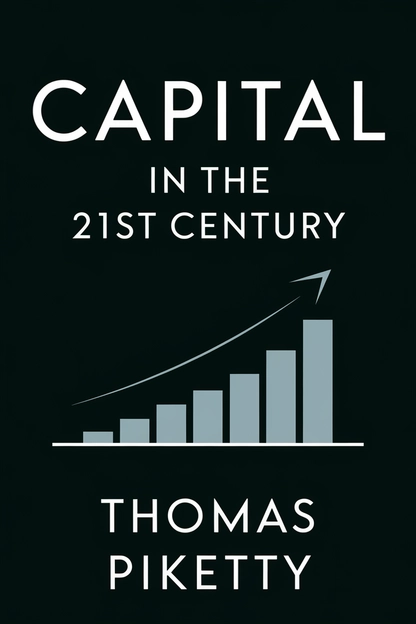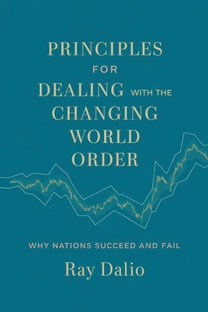
Capital in the 21st Century
by Thomas Piketty
Brief overview
This book examines how wealth has grown and changed shape over time, focusing on the forces that cause economic inequality to expand or contract. It challenges the idea that wealth and income naturally become more balanced, showing how slower growth and high returns on capital often favor those who already possess large fortunes.
Introduction
Inequality and the concentration of wealth have been major themes across economic history. This book starts by outlining how wealth has changed since the eighteenth century, tracing how land-based assets gave way to industrial and financial capital.
Early on, it challenges the notion that modern economic growth automatically leads to a fairer distribution of resources. Instead, historical fluctuations in growth rates, combined with political and social forces, have shaped how capital accumulates.
By diving into estate tax records, national financial data, and broader economic indicators, the book seeks to explain why inherited wealth still plays a powerful role in shaping societies.
The New Face of Capital
Capital used to be chiefly agricultural land, but now consists mostly of real estate, business ownership, and financial assets. Despite these changes, the size of total wealth has remained substantial when measured relative to national income.
Over time, countries with slower population growth often accumulate greater stocks of capital in relation to income. This high ratio can sustain the power of wealth-owners, even when economic growth appears to favor productivity and technology.
These patterns imply that the composition of capital may shift—yet its importance endures. Rather than vanishing, wealth changes in form, maintaining its influence on societal structures.
What is Capital in the 21st Century about?
"Capital in the 21st Century," authored by Thomas Piketty, offers an incisive exploration into the complexities of wealth accumulation and economic inequality. The book delves deeply into historical data to expose the persistent nature of wealth disparities and how they influence contemporary societies. A significant portion of Piketty's analysis indicates that the rate of return on capital often surpasses economic growth rates, thus exacerbating wealth inequality—a notion encapsulated in Piketty’s formula R > G (rate of return on capital > economic growth rate).
The book's central theme revolves around the idea that wealth concentration isn't merely a consequence of economic cycles but is strongly influenced by political decisions, policy frameworks, and societal norms. By extensively examining patterns from the 18th century to the present day, Piketty underscores how inheritance plays a pivotal role in perpetuating economic disparities. He argues that without prognostic reforms in taxation and policy, these imbalances are likely to deepen, affecting political power and social cohesion across the globe.
Piketty's work is a provocatively complex, deeply informative, and forcefully argued piece that encourages readers to rethink the dynamics of wealth and power in modern economies. With a comprehensive survey of historical trends, "Capital in the 21st Century" not only raises awareness about economic divides but also offers thoughtful insights into potential policy interventions to mitigate these enduring disparities.
Review of Capital in the 21st Century
Thomas Piketty's "Capital in the 21st Century" stands out due to its meticulous research and bold propositions for addressing wealth inequality. The book’s robust analytical framework leverages historical data to elucidate why economic growth has often failed to bridge the gap between rich and poor. Central to Piketty’s discourse is the pivotal role of inheritance in magnifying wealth disparities, presenting a compelling argument for rethinking tax policies and societal priorities.
A key strength of the book lies in its elucidation of economic concepts like R > G—showing how returns on existing capital surpass economic growth, thereby compounding wealth for those already affluent. This principle offers practical insights into policy-making, focusing on measures like progressive taxation to curb wealth concentration. Furthermore, Piketty’s accessible narrative and critical perspectives ensure that even readers without prior economic expertise can engage with this influential economic treatise.
For policymakers, economists, and socially conscious thinkers, "Capital in the 21st Century" is both an enlightening read and a call to action. It vividly paints a picture of a world where unmanaged capital flows concentrate wealth, threatening democratic values and equitable growth. With incisive vocabulary and a sweeping historical purview, Piketty makes a compelling case for systemic reform to safeguard the future of economic equity. "Capital in the 21st Century" is a must-read for anyone interested in shaping a fairer global economy.
Ultimately, the book is a crucial read for those who wish to better understand and tackle economic inequality through informed discussion and policy advances.
Who should read Capital in the 21st Century?
- Economists and Economic Students: Piketty's comprehensive analysis provides these readers with empirical data and concepts to advance discussions on economic inequality and capital.
- Policymakers and Government Officials: Those involved in creating or influencing fiscal policy can draw actionable insights from Piketty’s proposals on taxation and wealth redistribution.
- Social Scientists and Historians: As the book offers a historical perspective on economic trends, it's a valuable resource for analyzing socio-economic changes over time.
- Social Justice Activists: By laying bare the roots of wealth inequality, the book provides fuel for advocating changes in policy and popular discourse around economic equity.
- Educators and Academics: Instructors and researchers in economic and social studies will find Piketty’s analysis a thorough resource for classroom and scholarly work.
About the author
Book summaries like Capital in the 21st Century
Why readers love Mindleap
10-Minute Book Insights
Get the core ideas from the world's best books in just 10 minutes of reading or listening.
Curated For You
Discover your next favorite book with personalized recommendations based on your interests.
AI Book ExpertNew
Chat with our AI to help find the best book for you and your goals.
Reviews of MindLeap
Love how I can get the key ideas from books in just 15 minutes! Perfect for my busy schedule and helps me decide which books to read in full.
Alex R.
The summaries are incredibly well-written and the audio feature is perfect for my commute. Such a time-saver!
Jessica M.
Great app for personal growth. The insights are clear and actionable, and I love how they capture the essence of each book.
Chris P.
The app is beautifully designed and the summaries are top-notch. Definitely worth every penny!
Sarah K.



